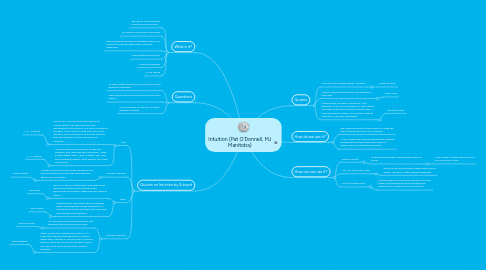
1. What is it?
1.1. The ability to understand something instinctively
1.2. No need for conscious reasoning
1.3. a thing that one knows or considers likely from instinctive feeling rather than conscious reasoning
1.4. Associated with instinct
1.5. Innate Knowledge
1.6. A Gut felling
2. Quotes
2.1. The only real valuable thing is intuition.
2.1.1. Albert Einstein
2.2. Intuition will tell the thinking mind where to look next.
2.2.1. Jonas Salk
2.3. Intuition and concepts constitute… the elements of all our knowledge, so that neither concepts without an intuition in some way corresponding to them, nor intuition without concepts, can yield knowledge.
2.3.1. Immanuel Kent
3. Questions
3.1. To what extent does intuition provide us with reliable knowledge?
3.2. What makes some people more intuitive than others?
3.3. How important is intuition in ethical decision-making?
4. How do we use it?
4.1. We need both instinct and reason to make the best possible decisions for ourselves
4.2. It tells us that the assumed difference between humans and animals is humans' ability to reason with our instinctual impulses,
5. How can we use it?
5.1. Keep a journal
5.1.1. Writing your thoughts and feelings down on paper
5.1.1.1. If you "think" it helps open up your non-conscious mind
5.2. Turn off Your Inner Critic
5.2.1. Often times we rationalize away those voices within. This time, listen without judgment.
5.3. Find a Solitary Place
5.3.1. A place where you can allow emotions to flow freely is an imperative part of finding and retaining the building blocks of intuition.
6. Quotes on Intuition by Subject
6.1. Arts
6.1.1. As you see, I do not treat the creation of fiction, that to say the invention and development of fantasies, as a form of abstract thought. I don’t wish to deny the uses of the intellect, but sometimes one has the intuition that the intellect by itself will lead one nowhere.
6.1.1.1. J. M. Coetzee
6.1.2. I have trusted to my intuition to find the subjects, and I have written intuitively. I have an idea when I start, I have a shape; but I will fully understand what I have written only after some years.
6.1.2.1. V. S. Naipaul
6.2. Human Sciences
6.2.1. Intuition becomes increasingly valuable in the new information society precisely because there is so much data.
6.2.1.1. John Naisbitt
6.3. Math
6.3.1. Thus, in a sense, mathematics has been most advanced by those who distinguished themselves by intuition rather than by rigorous proofs.
6.3.1.1. Felix Klein
6.3.2. Mathematical reasoning may be regarded rather schematically as the exercise of a combination of two facilities, which we may call intuition and ingenuity.
6.3.2.1. Alan Turing
6.4. Natural Sciences
6.4.1. It is through science that we prove, but through intuition that we discover.
6.4.1.1. Henri Poincare
6.4.2. When a scientist is ahead of his times, it is often through misunderstanding of current, rather than intuition of future truth. In science there is never any error so gross that it won’t one day, from some perspective, appear prophetic.
6.4.2.1. Jean Rostand
